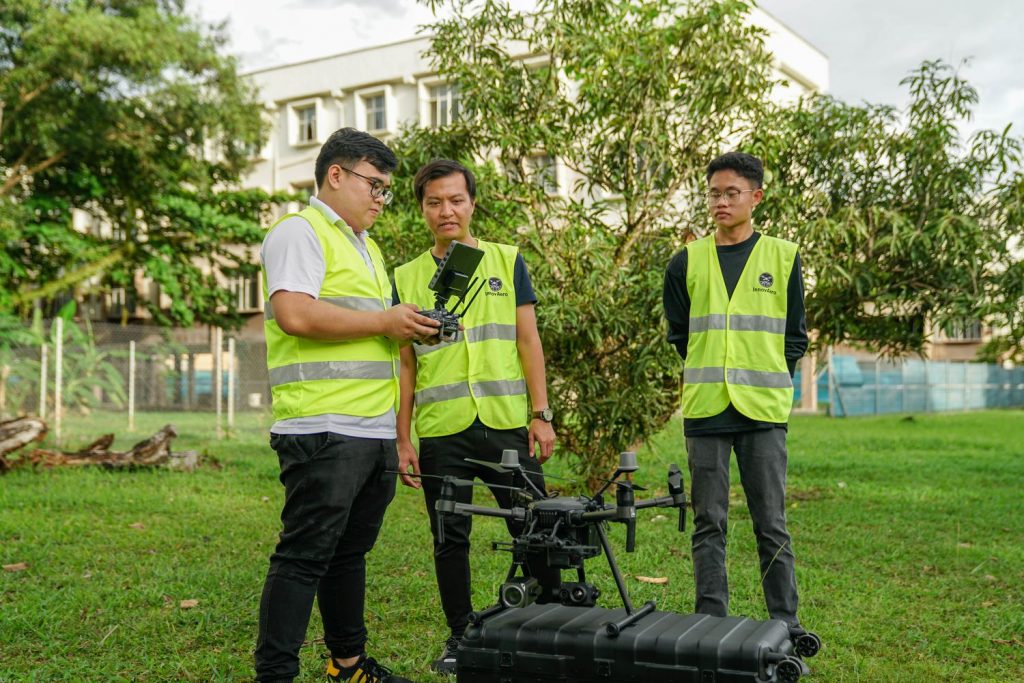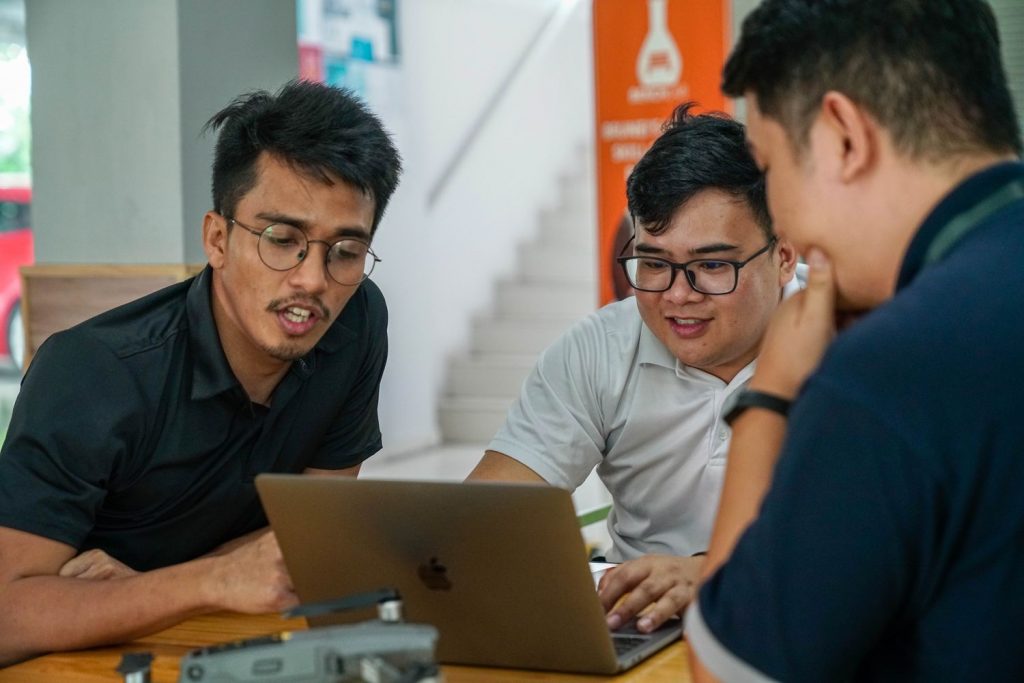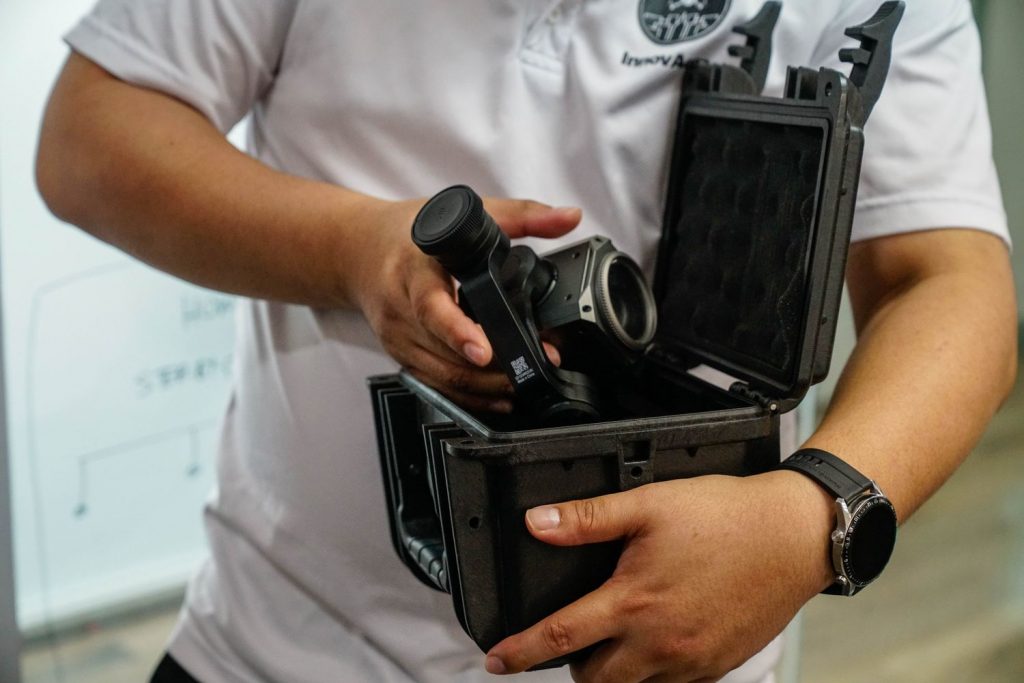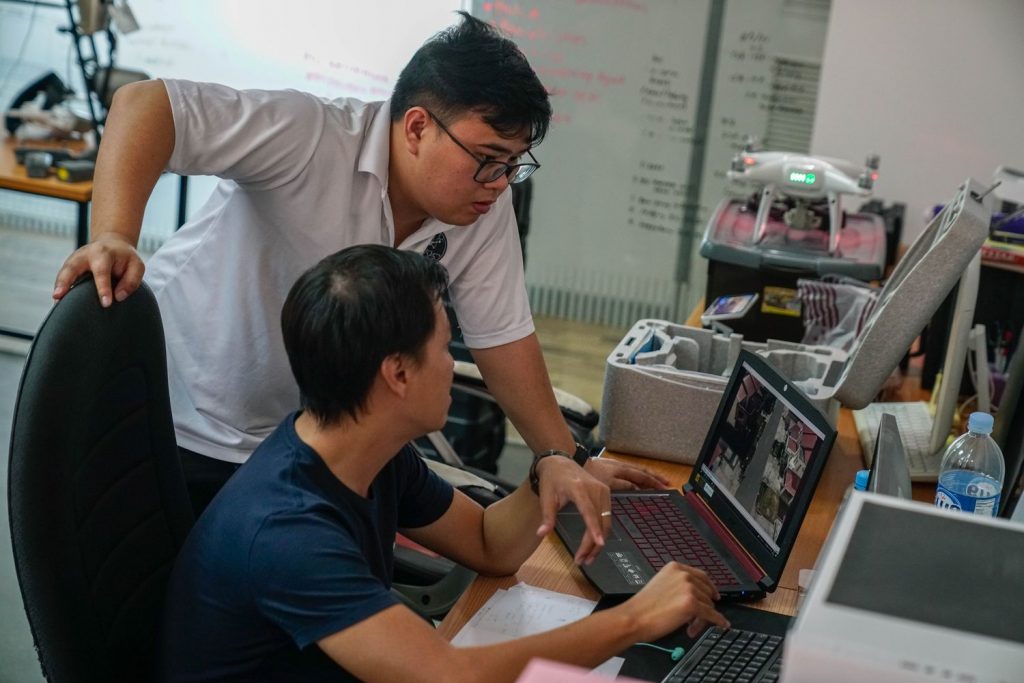Although drone controllers have made their way into the hands of the everyday person, their adoption in commercial and industrial settings only make up the minority of drone applications globally.
The leading application of drones worldwide continue to be the military – which accounts for 70% of the market – followed by regular consumers and hobbyists who make up 17% while commercial and civil sector use constitutes the remaining 13%.
Despite being the smallest category, the use of drones in the commercial and civil sector are forecasted as having the largest potential for growth.
By 2023, an estimated 2.4 million drones are expected to be shipped for business use – representing a growth rate of 66.8% – with five segments leading its application: agriculture, construction and mining, insurance, media and telecommunications, and law enforcement.
At the forefront of commercial drone use in Brunei is a startup called InnovAero, who in their two years of operations have secured some of the biggest drone projects in the country; including a year-long stint for crop monitoring and protection at Brunei’s biggest rice farm, telco tower site inspections for Unified National Networks and more recently, a six figure geospatial mapping project.

InnovAero isn’t stopping at catering to client projects; they are ambitiously casting sweeping frameworks aiming to usher a new era of drone use in the Sultanate, through a combination of an official drone website for registration and flight application as well as a drone academy.
The skills required for commercial drone flights and analysing the data collected are separate competencies. Their offshoot projects of setting up an online drone platform call for stakeholder engagement and regulatory insight, while their drone academy will tap into pedagogy.
Their self-assigned role of transforming the drone space requires multiple hats, all currently worn by InnovAero’s 28-year-old founder Ian Ong, a bold, brazen former draughtsman who began his professional career immediately after secondary school at the age of 17.
A proof of concept
Ian’s first business opportunity with drones came at the highest level with an introductory pitch to Brunei Shell Petroleum (BSP) in 2017 to do an unmanned aerial vehicle (UAV) inspection of their telco towers which are typically done manually by riggers.
The opportunity to pitch came after Ian’s close friend and a BSP contractor introduced him during a meeting. At the time, Ian had yet to acquire any experience with drones – but was keen to pursue the BSP opportunity through a joint venture that would engage a Malaysian drone solutions provider along with a few Brunei-based partners.
“We initially pitched the drone inspection as an alternative that was cheaper, safer and would require less time (than a manual inspection) but would provide the user with very detailed data,” said Ian.
Ian’s venture showed early promise, with BSP requesting a proof of concept (POC) on select sites following their pitch. The POC was positively received according to Ian, but internal differences within the venture prevented a deal from materializing.
Ian would part ways with his early partners, and on the advice of BSP seniors, made his way to Darussalam Enterprise (DARe) to learn how he could build his own startup.

From Megabytes to InnovAero
After meeting with DARe’s startup development unit, Ian founded Megabytes and enrolled to DARe’s flagship startup programme Accelerate under its fourth cycle in 2018.
After completing the 100-day accelerator, he was given an office at iCentre and secured his first major piece of business with BSP’s social investment arm LiveWIRE to supply and service three DJI Agras drones for their AgroBiz Padi Agropreneur programme.
Included in the arrangement was training and demonstration of the DJI Agras – an industry-leading crop spraying drone – which Ian learned how to operate in-person from the authorised suppliers in Malaysia.
“By being the first supplier of the DJI Agras in Brunei, we indirectly became the first (from Brunei) to learn how to operate and service it, which also enabled us to form relationships with the DJI supplier,” said Ian.
Intent on securing bigger contracts with established corporations, Ian moved the activities of Megabytes’ sole proprietorship and incorporated as a sendirian berhad (private limited) under a new company called InnovAero.




InnovAero’s main drones are the DJI Agras for agricultural use and MK210 RTK for site inspections and geospatial surveys. InnovAero has also ventured into commercial aerial photography and videography, although this isn’t the business’ main focus.
Pioneering UAV agriculture during COVID-19
The travel restrictions and social distancing measures to combat the outbreak of COVID-19 encouraged the exploration of new working arrangements. In the agriculture sector, reduced manpower on the fields of Brunei’s biggest rice farm in Wasan represented an opportune time to trial the use of drones for crop monitoring.
The Department of Agriculture and Agrifood Department (DAA) under the Ministry of Primary Resources and Tourism (MPRT) engaged InnovAero for a year-long project, during which drones were able to detect and limit the spread of a pest outbreak.
The drones used algorithms to create a map that profiled healthy, stressed or dead crops represented in shades of green, yellow and red respectively.
“Across four weeks we were able to progressively document a significant change on the normalised difference vegetation index (NDVI) map, indicating major crop damage,” said Ian.
The damage was attributed to a grasshopper infestation, which could be dealt with traditionally by slash and burn or the spraying of pesticides. DAA handed over 12 cartons of pesticides to InnovAero, but the precise aerial spraying through drones meant that less than one carton was needed cover the 72 hectares affected, which was completed in four days.
“We were able to halt the spread very quickly, and prevented the outbreak from spreading over the over 300 hectare site,” added Ian. “Drone spraying can be hugely beneficial for farmers, so we’ve continued to offer the service (individually) to farmers for $35 a hectare.”
PaddyCo, the government-owned operator of KKP Kandol – set to eclipse Wasan as Brunei’s biggest rice farm once fully developed – has also engaged InnovAero for drone spraying.
On a mission for drone adoption
For drone solutions providers, marketing and networking are just as important as technical acumen.
In nascent markets like Brunei where commercial application is especially limited, providers must tirelessly champion market adoption by constant pitching, developing POCs – anything to showcase the potential of their work – sometimes even for free.
Ian’s zealous disposition, backed by a decade’s worth of technical work for contractors in the foreground, is an undeniable contributor to InnovAero’s rise. While his classmates from Sekolah Menengah Pengiran Isteri Hajah Mariam, Serasa pursued further education, Ian – a stateless permanent resident – chose a different path by beginning full-time work in 2009.
“Knowing my parents would have to pay for my education, transport and so on if I continued my studies, I just didn’t want to burden them,” he said. “I started with zero; I had no qualifications (when I began work) apart from my O-Levels. But I knew if I started early I could be independent quickly and even help out my family.”
Despite his lack of academic achievement, Ian productively spent a decade learning on-the-job as first a draughtsman, and then later as a project coordinator for construction and telecommunication contractors.
Today, Ian’s technical and project management experience grounds his understanding of clients’ assets in ways other young startup founders may struggle to familiarize.

As a first-mover in this space, Ian has also gained first-hand insight into existing regulatory processes and policies of drone use in Brunei, which has helped the 28-year-old’s ability to see the bigger role that drones can have in the country’s digitalisation ambitions.
“We started building the TakeOFF website last year to help the government digitise the drone registration and flight application (permit) process within a single platform,” said Ian.
“From the users’ standpoint it helps simplify drone use in Brunei. You can register all your drones and monitor the status of your flight applications easily.”
InnovAero’s business model for TakeOFF is applying nominal, one-off registration fees, as well as institute mandatory drone training which they aim to provide by setting up a drone academy.
“Similar how you need a license to drive a car or fly a plane, flying a drone should have its own dedicated training and certification,” said Ian.
InnovAero’s proposal for UAV operator certification under their academy covers over 70 hours of training including theoretical classes and flight simulation culminating in an outdoor flight test. The certification is intended for those flying drones professionally, and may be scaled down for hobbyists and recreational flyers.
Ian shared that both TakeOFF and the InnovAero Academy have received positive feedback from the relevant authorities, but are still awaiting official endorsement before launching.
InnovAero’s growing list of equipment is now worth six figures, with drones and attachments capable of rapid thermal imaging, carrying customized payloads and providing up to 30x optical zoom. Ian is also developing a framework for them to finally enter the oil and gas a market which first eluded him over four years ago.
“We are hoping that this year will be one of many breakthroughs for drones in Brunei,” says Ian. “Brunei is on a big digitalisation push right now and I really believe drones can not only save us time and money but provide us with unprecedented data insight that with will bring us to a new level of analysis and understanding.”












